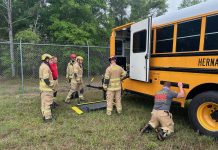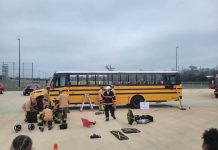School bus drivers and aides must be prepared to make life and death decisions in a matter of seconds. Extensive field research and evaluations of hundreds of school employees around the nation has helped to explain why so many educational employees, including school bus drivers, have at times been unable to make solid decisions under these extremely challenging conditions.
For example, psychologist Gary Klein’s extensive field research(1) with fire commanders, military personnel, emergency room staff and others who must routinely make decisions under life and death conditions revealed that people need a base of knowledge to enable them to quickly select appropriate courses of action during crisis events. Our simulations with hundreds of school employees over the past two years have identified a distinct correlation between the manner in which employees are trained and drilled along with the types of emergency plan components they are provided and their ability to rapidly respond to video table top exercises correctly. We have also noted similar influences when we have been brought in after the fact in the wake of major school crisis events such as multiple victim school shootings.
Klein points out that mental simulation can help people develop a solid base of experience to improve their ability to function effectively while under extreme time pressure and life and death conditions. Mental simulation involves a variety of concepts which will allow an employee, such as a school bus driver, to experience a range of crisis situations and to mentally practice making the types of decisions they will need to make under actual conditions.
For mental simulation to be effective, the person being trained needs to be provided information that will help them make the correct choices for various situations they will encounter. One approach that can be helpful is to provide people with role specific job aids that outline specific action steps for a variety of different situations such as a tornado, fire on the bus, weapons assault or hostage situation. While emergency plan components such as ready reference charts should never be viewed as a manual to follow during the first critical seconds of a crisis, they can help prepare personnel to respond to a variety of situations. Backing this type of document up with good quality training, drills, and forms of mental simulation along with proven techniques like controlled breathing can help bus drivers and aides perform more effectively if they are faced with fast breaking life and death situations.
Taking the time to provide a solid base of experience for drivers may one day prove to be well worth the energy expended. Failure to do so may result in irreparable harm.
(1.) Klein, G. (1998). Sources of Power – How People Make Decisions. Massachusetts: The MIT Press.
Mike Dorn is the executive director of Safe Havens International, a global, non-profit school safety center for kindergarten through 12th grade. He is a former school district police chief for Bibb County, Ga., a former school safety specialist for the Georgia Emergency Management Agency and a former anti-terrorism planner and lead program manager at the Georgia Office of Homeland Security.















